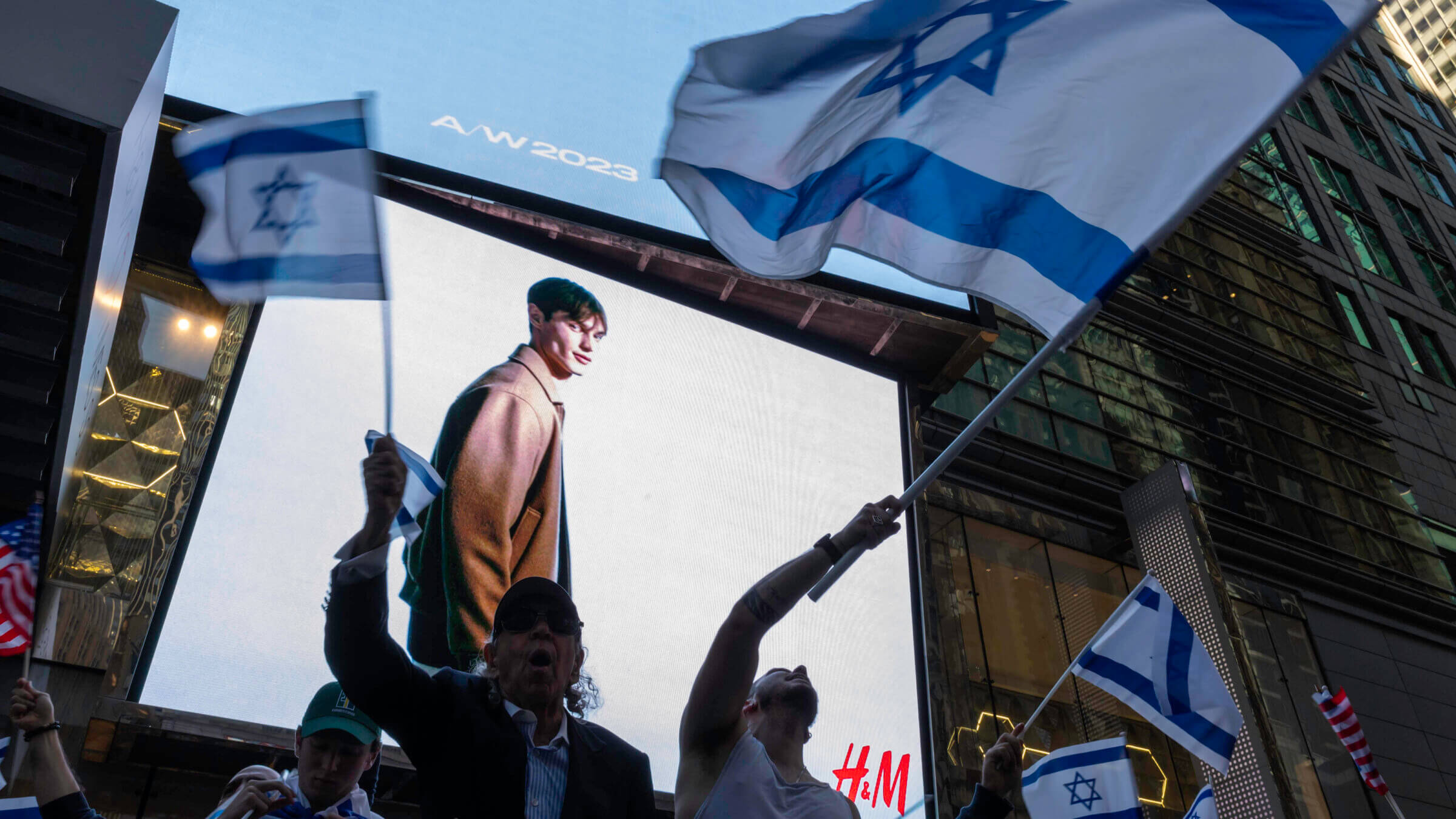The March for Israel will make Jews everywhere less safe
Israel’s war with Hamas won’t end the cycles of violence that led to the Oct. 7 attack — it will ensure they persist

Pro-Israel counterprotestors hold signs and flags on October 13, 2023 in New York City Photo by Alex Kent/Getty Images
The Conference of Presidents of Major American Jewish Organizations is organizing a rally in Washington, D.C. today to show unconditional support for Israel in its war on Gaza.
The demonstration is purportedly about showing unified, unequivocal support for the Israeli government amidst its assault on Gaza, demanding a safe return of the hostages held by Hamas in Gaza and combating the rise of antisemitism around the globe since the onset of war. The organizers of this event, who have largely forsaken the word “peace” in marketing the rally, want this to be one of the largest pro-Israel demonstrations in U.S. history.
I know that many American Jews will be in our nation’s capital today at the encouragement of these American Jewish institutions and leaders, convinced that it will help advance Jewish safety, not just in Israel-Palestine, but across the world.
But I’m convinced it will do the opposite.
By giving a green light to Israel’s horrifying military campaign in Gaza, the march will make Jews — and our allies — less safe.
No plan for peace
Since Oct. 7, when Hamas killed more than 1,200 people in Israel, I, like so many others across our community, have been overcome with pain and horror. I know many who are connected to the victims of this horrific attack. I mourn this unimaginable loss of human life and pray for the release of hostages so they can return to their loved ones.
But the violence did not begin or end on Oct. 7.
Before Oct. 7, Israel maintained a deeply violent reality of occupation and apartheid that has bred resentment and hopelessness among the Palestinian people. And since Hamas’ terrorist attack, the Israeli government and military have embarked on the most deadly assault on the Palestinian people since 1948, killing more than 11,000 Palestinians, 4,600 of them children, per numbers from the Hamas-run Gaza Health Ministry; injuring tens of thousands; and displacing an estimated 1.7 million people in Gaza — all while largely cutting Gaza’s population off from food, water, electricity and medicine.
The organizers of today’s rally are providing the appearance of unconditional backing to an Israeli government that has made it clear that it is more interested in destruction than an arrangement for lasting peace.
Prime Minister Benjamin Netanyahu rejected a proposal for a five-day ceasefire in exchange for the return of some of these hostages just a few weeks ago. And the Israeli military’s continued bombardment of Gaza goes against the wishes of many of the families of those held hostage, who have rallied around a call for Israel to strike a deal with Hamas that would exchange “everyone for everyone” — all the hostages in Gaza for all of the Palestinian political prisoners in Israeli jails. Many are speaking out against the war, pointing out that their loved ones who have been killed or kidnapped were peace activists who would have been horrified by Israel’s assault on Gaza.
American Jewish groups like IfNotNow, Jewish Voice for Peace and Jews for Racial and Economic Justice, who have organized many “Jews for Ceasefire” actions, have made it clear that a potential ceasefire and safe return of hostages must go hand in hand — echoing the demands of Israelis, whose protests against the war have suffered an increasingly harsh crackdown by Israel’s government.
It stuns me that the organizers and attendees of today’s rally, some of whom have vocally opposed a ceasefire and de-escalation of this brutal conflict, are demanding a safe return of hostages while simultaneously resisting one of the main paths to their safe return: Immediate diplomatic negotiations.
Meanwhile, the American government continues to green-light this massacre in Gaza. While members of Congress like Senator Lindsay Graham and presidential candidates like Nikki Haley have echoed the painfully militaristic rhetoric of Israeli leaders, the only American politician who has been censured is the sole Palestinian American member of Congress, Rep. Rashida Tlaib. (Other proposed censures have been introduced, including of a Republican representative who compared Palestinian civilians to Nazis.)
A cycle of violence
One of the most painful parts of these last five weeks has been watching so many people in my beloved Jewish community allow their very real grief and trauma to limit their ability to see or feel other suffering beyond their own. My heart breaks as I watch the institutions that shaped me actively recruit people to attend this misguided rally. I want to send the same message to each and every person marching today that Tlaib shared on the floor of Congress, “The cries of the Palestinian and Israeli children sound no different to me. What I don’t understand is why the cries of Palestinians sound different to you all.”
Violence only begets more violence, war crimes only begets more war crimes. Linking the fight for Jewish safety with a campaign to annihilate Palestinians makes Israeli Jews less safe by ensuring another cycle of violence. And it threatens the safety of Jews across the diaspora, who are being targeted by the blowback to this military operation by those who wrongly conflate all Jews with Israel.
The longer Israeli violence in Gaza continues, the more we know innocent members of our communities will be targeted in the U.S. and around the world.
What’s clear is that, at a time of great division in our country, today’s rally will only deepen the divide between the Jewish community and the Muslim and Palestinian communities in America. The only way to keep all of us safe is to find new ways to bring our communities closer.
The horrific violence of Oct. 7 should have made clear to us all that Israeli Jews will not be safe as long as they continue to enforce a violent regime of apartheid over millions of Palestinians. Jewish safety cannot and will not come at the expense of Palestinian safety. We need another future — one in which Israelis and Palestinians live in true equality and justice. That’s why I and hundreds of thousands of American Jews, Palestinian-Americans, and Americans of all stripes are fighting for a ceasefire in the streets every day.
I invite those who share those values to join us. Instead of marching for more war and more isolation, march for safety, peace and equality for all.
To contact the author, email [email protected].

















